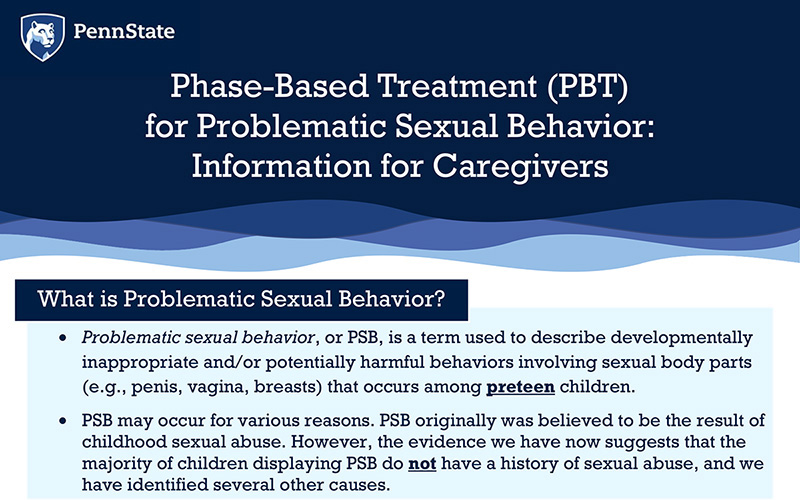
The background image is School children holding hands and going to school together
Phase-Based Treatment of Preteen Problematic Sexual Behavior
PBT is an evidence-informed, culturally-adaptable, trauma-sensitive and individually-administered treatment for children between the ages of 3 and 12 displaying problematic sexual behavior (PSB). PBT is applicable with diverse forms of PSB (e.g., self-focused, interpersonal).
About PBT
How does PBT Work?
PBT works primarily with a child’s caregiver to maximize immediate impact and create lasting change. Working with a trained clinician, caregivers are able to identify factors that may be maintaining the PSB, implement effective behavior change techniques, teach the child helpful lessons about sexual body parts that are consistent with their own religious and cultural values, and open the line of communication regarding such topics so the child will come to them with questions in the future. In addition, caregivers and children learn applied skills that may help reduce the likelihood of PSB recurring.
How Long does PBT Last?
PBT is designed to be implemented in 10-12 sessions of standard length (i.e., 45 minutes). So, if PBT is implemented in sequence, it may take no more than 10 to 12 weeks. However, PBT is flexible enough that it can be integrated into other treatment programs, such as Trauma-Focused Cognitive-Behavioral Therapy (TF-CBT) or Parent-Child Interaction Therapy (PCIT). In these instances, treatment is likely to be longer. The manner in which PBT is delivered in based on a thorough assessment and determination by a trained clinician.
Does PBT Work?
PBT is based on the latest empirical research regarding the development and treatment of children with PSB. In non-controlled research, including open pilot trials and program evaluations from several states, PBT demonstrates a large and statistically significant effect. A randomized controlled trial comparing PBT to an active control group is currently ongoing. Information on research related to PBT can be found under Resources.
Training
Training in PBT involves two full days of didactic and experiential activities. Clinicians then return to their home sites and begin seeing cases while attending monthly consultation calls with the trainers over the course of 12 months. At the current time, PBT training is only being offered under contract with agencies; no general registration opportunities for individual clinicians are available. If you are interested in hosting a PBT training, please contact Dr. Brian Allen at ballen1@pennstatehealth.psu.edu.
Meet the Team
Resources and Publications
Peer-Reviewed Research Discussing PBT
- Allen, B., Berliner, L., Shenk, C. E., Bendixsen, B., Zellhoefer, A., Dickmann, C. R., Arnold, B., & Chen, M. J. (2018). Development and pilot testing of a phase-based treatment for preteen children with problematic sexual behavior. Evidence-based Practice in Child and Adolescent Mental Health, 3, 274-285. DOI: https://doi.org/10.1080/23794925.2018.1515580
- Dickmann, C. R., Zellhoefer, A., Arnold, B., & Allen, B. (2018). Implementing a phase-based treatment for preteen children with problematic sexual behavior: Case examples. Evidence-based Practice in Child and Adolescent Mental Health, 3, 286-293. DOI: https://doi.org/10.1080/23794925.2018.1515581
- Allen, B. (2023). Etiological perspectives on problematic sexual behavior of preteen children: Implications for treatment. Clinical Child and Family Psychology Review, 26, 50-64. DOI: https://doi.org/10.1007/s10567-022-00412-5
- Allen, B., & Berliner, L. (2015). Evidence-based, individual treatment of child sexual behavior problems: A case study. Archives of Sexual Behavior, 44, 2323-2331. DOI: https://doi.org/10.1007/s10508-014-0460-6
Peer-Reviewed Research Relevant to PBT
- Allen, B., & Ferrer Pistone, L. (2023). Psychometric evaluation of a single-item screening tool for the presence of problematic sexual behavior among preteen children. Child Abuse & Neglect, 143, 106327. DOI: https://doi.org/10.1016/j.chiabu.2023.106327
- Allen, B. (2018). Trauma-focused cognitive-behavioral therapy (TF-CBT) with pre-teen children displaying problematic sexual behavior. Cognitive and Behavioral Practice, 25, 240-249. DOI: https://doi.org/10.1016/j.cbpra.2017.07.001
- Allen, B., Timmer, S. G., & Urquiza, A. J. (2016). Parent-Child Interaction Therapy for sexual concerns of children with maltreatment histories: A preliminary investigation. Child Abuse & Neglect, 56, 80-88. DOI: https://doi.org/10.1016/j.chiabu.2016.04.008
- St. Amand, A., Bard, D. E., & Silovsky, J. F. (2008). Meta-analysis of treatment for child sexual behavior problems: Practice elements and outcomes. Child Maltreatment, 13, 145-166. DOI: https://doi.org/10.1177/1077559508315353
- Chaffin, M., Berliner, L., Block, R., Johnson, T. C., Friedrich, W. N., Louis, D. G. et al. (2008). Report of the ATSA Task Force on Children with Sexual Behavior Problems. Child Maltreatment, 13, 199-218. DOI: https://doi.org/10.1177/1077559507306718


